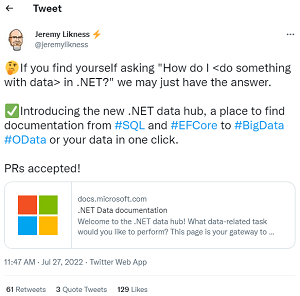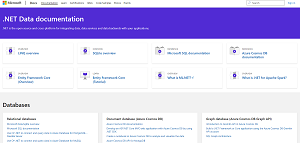News
New '.NET Data Hub' Is One-Stop-Shop for .NET Data Handling
Microsoft last week unveiled the .NET Data Hub, a new landing page bringing together everything related to data handling in .NET.
Some two years in the making, the data hub was proposed by Microsoft's Jeremy Likness, senior program manager for .NET Data, who announced the new hub in a July 27 tweet that said: "If you find yourself asking 'How do I <do something with data> in .NET?' we may just have the answer. ✅Introducing the new .NET data hub, a place to find documentation from #SQL and #EFCore to #BigData #OData or your data in one click."
 [Click on image for larger view.] Announcing the Data Hub (source: Twitter).
[Click on image for larger view.] Announcing the Data Hub (source: Twitter).
The original June 2020 GitHub issue authored by Likness said: "A new .NET Data landing page will help .NET developers quickly navigate to the area of interest. Data spans multiple topics, so first it is important that the categories and topics are correct. Ultimately this may result in sub-category pages being created. Once the hierarchy and topics are approved, new issues will be created to track the categories and determine what documents can be linked to 'as is,' what documents will need to be updated and what new documents should be created."
The effort continued in this issue, where Likness in April said the hub could help .NET developers easily navigate to documentation for:
- relational, document, and graph databases
- ORM (EF Core)
- distributed cache, key/value store - Orleans, Azure Redis
- blob storage
- event management (bus, queue, event store)
- API (gRPC, SignalR, OData, GraphQL)
- serialization - Text.Json, Xml
- big data - .NET for Spark
- machine learning - ML.NET
- ETL - Synapse
Indeed, the new ".NET Data documentation" site provides overviews ranging from LINQ to SQLite to Entity Framework Core, with sections for databases (relational, document, graph and more), data services (EF Core, Big Data and more) and APIs (REST, OData, GraphQL and more).
 [Click on image for larger view.] Data Hub (source: Microsoft).
[Click on image for larger view.] Data Hub (source: Microsoft).
The data hub was also touted by Arthur Vickers, engineering manager for .NET Data and Entity Framework, whose Aug. 4 .NET data biweekly update asked for feedback on organization or missing topics.
Entity Framework Core 7
Vickers also reported the dev team is working hard to land .NET 7 and EF7 features, including:
Microsoft last month released Entity Framework Core 7 Preview 6, which it dubbed the "performance edition" because the dev team focused on EF Core's update pipeline, a component that implements SaveChanges and is responsible for applying inserts, updates and deletions to a database.
Going forward, developers can check the "Plan for Entity Framework Core 7.0" to see what's on tap for a November shipping date (along with .NET 7).
It says the development investments in EF7 fall mainly under these themes:
- Highly requested features
- .NET platforms and ecosystem
- Clear path forward from EF6
- Performance
About the Author
David Ramel is an editor and writer at Converge 360.